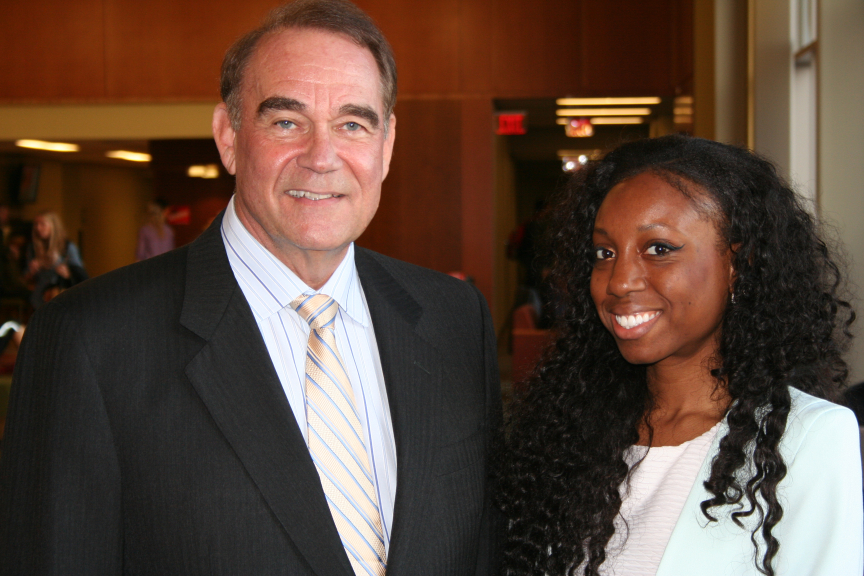Knowing what he does about airline crashes and their often complicated legal outcomes, you’d think Roger W. Clark ’78, who has practiced in aviation law for three decades, would rather not fly.
But to teach Aviation Law to third-year students at Rutgers, as he has for nearly a decade, he flies devotedly to Camden from California, where his firm The Clark Law Group is located.
For him, flying is far from a fearsome undertaking, but rather represents the epitome of freedom. “I grew up on Air Force bases around the world. As a youngster, I was exposed to airplanes taking off and landing every day,” he recalls. “I learned to love the sound of airplanes; they were the sound of freedom.”
And sitting on a plane, he contends, is far safer than sitting in one’s own bathroom. Yet Clark of course acknowledges the need to establish passengers’ trust in airlines to transport them safely and comfortably to destinations across the globe. As he told his Rutgers–Camden Aviation Law students this past semester, “Passengers are vulnerable. They put their lives in the hands of the flight crew.”
This immense responsibility isn’t just something he knows from the various complex cases he’s handled over the years, but from actually flying planes himself. In 1982, the Rutgers Law–Camden alumnus earned his private pilot certificate from the Federal Aviation Administration.

“Aviation is part science, part art, but knowing how an airplane works, knowing the parts that go on an airplane, how they function, how air traffic control works, and its rules and regulations, helps you find out precisely what happened when something does go awry.”
This persistent awareness of air travel’s potential risk has made commercial aviation the most scrutinized and monitored mode of transportation today. With roughly 10 million flights per year in the U.S. alone, commercial aviation represents effective management and implementation of highly sophisticated machinery, scheduling, and operations – a complexity that is especially apparent through the studying and practicing of aviation law.
“Everybody comes into class asking ‘what is aviation law’? The concept seems very vague,” says Clark, who also served as an instructor of Business Law at Florida International University. “What always seems to surprise students is how many different tentacles aviation law has, from complex civil procedures, federalism issues, to what state or federal law can be applied. Sometimes administrative law applies or constitutional law applies. When there is a significant air disaster you are just dealing with many moving parts.”
Named adjunct professor of the year in 2009, Clark engages his students about the complexities and curiosities of the field, while bringing the real world and its practical experiences with him into the classroom. He is also soaring to new heights to make the Rutgers Law–Camden education he so values more feasible to students who also travel from a great distance.
On a recent visit to campus, Clark made a point to meet Abimbola Moses, also from California, who is this year’s recipient of the Horizon Scholarship. Established by the Rutgers School of Law-Camden Class of 1978, through the leadership of Clark, this scholarship supports a full-time law student to help cover the cost of on-campus housing. Clark aims to garner more financial support to expand the program to fund additional students.
In addition, Clark and his family have also established the Roger William Clark Endowed Scholarship to provide financial assistance to students who are California residents; and have contributed to the law school’s new state-of-the-art facility, which opened in 2009, by naming the Dean’s Suite.
“While only being a student here for a few months, I can already see why Mr. Clark commits so much of his time here,” offers Moses, a first-year law student, living on campus. “Having the opportunity to live closer to school has greatly aided my adjustment to the school and eased my transition process as a 1L moving from the west coast to live in New Jersey for the first time.”
Clark sees the Horizon Scholarship as a meaningful investment in those with great passion and academic ability, but limited financial resources.
“There are so many deserving people that struggle to get their education and a lot of my classmates were like that. By having the Horizon Scholarship and other scholarship opportunities, it gives people who want to pursue law the chance to pursue their dreams,” Clark continues. “We’re all much richer for it, because the people who bring passion to their work enrich us far beyond any money we might invest.”